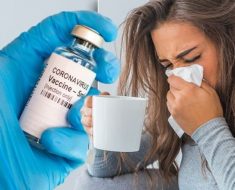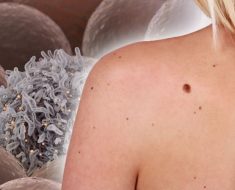If you feel like you’re constantly dripping with sweat all summer, you’re not alone. But surprisingly, it’s not just the rising temperatures that can cause you to heat up. “The main function of sweat is to help us cool down as the sweat evaporates from our skin,” says Dr. Melynda Barnes, Clinical Director for Rory. “As we all have experienced, we can sweat when we are nervous even if we are not hot. We actually have two types of sweat glands: eccrine glands, which are activated when we exercise or when we are hot, and apocrine glands, which are activated when we are nervous and these glands are concentrated more in our groin and armpits.”
Of course, some people sweat more than others. “In general, we’re all different, so yes, some people sweat more than others just like some people run faster than others,” says Osita Onugha, MD, thoracic Surgeon at Providence Saint John’s Health Center’s Hyperhidrosis Program in Santa Monica, CA. “Genetic differences are what allow for differences in sweating. However, the question is do we know what causes people to sweat abnormally. And that answer is not clear.”
If you’re truly an excessive sweater, you might have a condition called hyperhidrosis. “It is relatively rare and typically occurs in situations where sweating would be expected — heat exposure, exercise or being stressed,” explains Kristine Arthur, MD, internist at MemorialCare Orange Coast Medical Center in Fountain Valley, CA. “The amount of sweat is just excessive.” Hyperhidrosis involves lots of sweating of the hands, armpits, and feet, even if you haven’t been active, to the point where it affects your ability to perform daily activities, like writing with a pen or wearing flip flops.
To help keep you cool, we explain each sweat trigger that might surprise you.
Anger
“When you’re angry, your body releases stress hormones, which also activate your sweat glands, in addition to raising your blood pressure and your body temperature,” Barnes says. “So not only does being angry make you stressed but it also makes you hot, which activates both sweating pathways. If you find yourself angry all the time, or having a hard time managing your anger or how you express yourself when you are angry, you should reach out to your physician or mental health provider.”
Stress
“Stress activates the hypothalamus, which serves as a thermal regulatory center for the body,” explains Onugha. “The hypothalamus controls both blood and sweat to the skin surface.” That means when you’re worried or anxious, the hypothalamus sends a signals to the apocrine sweat glands and kicks them into high production.
Spicy foods
If you’re chowing down on a food that is spicy due to peppers, that means it contains a chemical called capsaicin. “Capsaicin activates the nerves responsible for sensing body heat and makes your body feel warmer,” Barnes says. “Because your body feels warmer, the sweat glands, primarily the eccrine glands, are activated in an attempt to cool down. It is normal to sweat while eating spicy foods and the degree of sweating may differ by each individual.”
Coffee
The no-so-secret ingredient in coffee that turns up your body heat? Caffeine! Yep, the waker-upper is a stimulant, which activates your nervous system and causes an increase in blood pressure, heart rate and activates your sweat glands. The more you drink or the stronger it is —think double espresso versus regular coffee — the more that you may sweat. Temperature has something to do with it, too. “Coffee, hot tea, or any hot beverage can increase the body’s core temperature by stimulating the body’s thermoregulatory center to produce sweat to cool the body,” Onugha explains.
Medication
We all know that medications come with plenty of side effects, but you may not have realized that sweating, and even hyperhidrosis, is a common one. “Medications that increase serotonin affect the hypothalamus and thus can increase our core body temperature which will cause us to sweat,” Barnes explains. “Medications that increase serotonin include SSRIs (selective serotonin reuptake inhibitors) and triptan migraine medication. Pain medication can make you sweat as well. Over the counter medications like ibuprofen or aspirin cause the blood vessels to dilate, so that heat can be lost through the skin, which can also trigger sweating.” Prescription pain medications, like opioids and tramadol, can also cause sweating. But if you’re experiencing profuse or continued sweating, even if it is a known side effect of a medication, check in with your doctor.
Menopause
Menopause is typically associated with two types of sweating: hot flashes and night sweats. Night sweats are hot flashes that occur at night and can disrupt sleep. “Women may wake up drenched in sweat, requiring them to change their sleepwear and sheets,” Barnes says. “Night sweats, along with hot flashes, are known as vasomotor symptoms. They are generally not dangerous, although they can be very disruptive to a woman’s life. Hot flashes are short, sudden episodes of the feeling of intense heat of the head, neck, and chest. When a hot flash occurs with a red face, neck, and/or chest it is called a hot flush. Hot flashes typically follow a consistent pattern that is unique to the person. Some women experience sweating and/or palpitations during these episodes. Hot flashes can occur at any time, day or night, without warning. They usually last three to five minutes, but the duration can vary from 30 seconds to 30 minutes. Some women can have hot flashes up to twenty times a day or more.”
If any of these are causing you to work up a super sweat, there are few tricks to help you cool down. “For people who are more sensitive to triggers (heat, spicy foods, emotional stress), decreasing your exposure to those triggers can be very effective at decreasing your sweating,” Barnes says. “Some other lifestyle and home remedies to help with sweating include weight loss (if you’re overweight), wearing clothes and socks made of natural fabrics — cotton, silk — which allow your skin to breathe, and relaxation techniques. If the soles of your feet sweat a lot, then changing your socks frequently or taking off your shoes (when you can) can help. Make sure to bathe daily to decrease the amount of bacteria in your groin and armpits, which can help decrease the odor associated with sweating.”
Also, apply an antiperspirant to help keep you dry. (The same isn’t true for deodorants, which just work on minimizing any odor associated with sweating.) “The goal of deodorant is to mask the odor with a fragrance,” Onugha says. “The goal of an antiperspirant is to stop sweating. When you look closely at the ingredients, antiperspirants usually have a metal that blocks the pores from releasing sweat.” Try an over the counter antiperspirant to take that up a notch.
However, if you’re still sweating buckets and don’t think the issue is triggered by any of the above, an underlying health issue could be the culprit. “Some hormone issues can cause excessive sweating in general,” Arthur says. “These include things like hyperthyroidism and adrenal disease. Both of these conditions need to be treated and can be detected with blood and/or urine testing in your doctor’s office. These diseases can be successfully treated with medications and/or other treatments.”
The most worrisome reasons for night sweats are infections and cancer. Examples include lymphoma, leukemia, tuberculosis, osteomyelitis (infection of the bone), endocarditis (heart infection) or HIV. Your doctor will ask you about a number of other things like, whether you have been around anyone else who is coughing or sick, if you are coughing up any blood, any recent travel, any bone pain, weight loss or fevers. You will need to have blood tests done and possibly imaging like an X-ray or echocardiogram. In the case of infection, it is extremely important to be treated as soon as possible as the infection may spread rapidly and cause significant damage or you may spread it to others.
Other causes include certain medications like some antidepressants as well as low blood sugar. People with diabetes, especially those taking insulin, need to immediately check their blood sugar if they wake up drenched in sweat.
“The bottom line is if you are having any type of excessive, drenching sweating you should see your doctor,” Arthur says. “If these episodes occur only at night, be sure to let your doctor know this, as well as mentioning any other symptoms you are having, any recent travel or any exposure to people who may be sick.”
Source: Read Full Article





